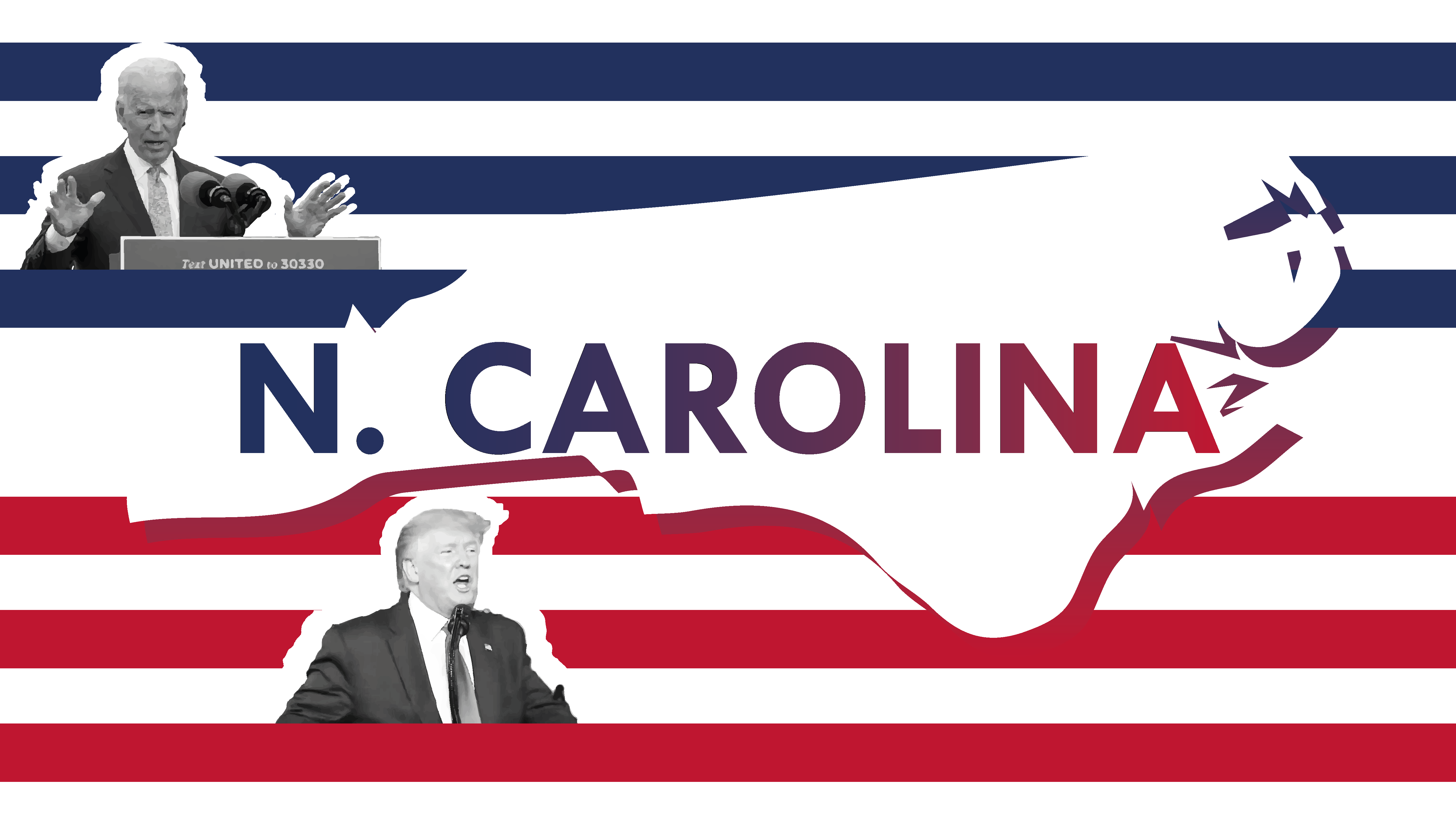We are in 1663. The Stuart dynasty has just taken back its place on the throne of England, with the help of a handful of noble families. Charles II, King of England, Scotland and Ireland, repays this kind gesture by distributing generously some lands overseas, and thus is born North Carolina.
The rest of the story is common knowledge: the settlers bring with them war, illness and slavery to the New World. The American nation rises in this original violence, and North Carolina plays a full part in the process. In fact, it is the first state to appoint representatives to the Continental Congress that voted the Independence (which is certain) as well as the first one to write a declaration of independence (which is less certain1North Carolina jealously defends the authenticity of the Mecklenburg Declaration of Independence, supposedly signed in 1775, thereby preceding the other declarations of independence). A hundred years later, it secedes to maintain slavery. All in all, a very complex story…
Still to this day North Carolina struggles to hide the weight of its protean past. Although the old wool and tobacco factories have closed down to give way to technological hubs and ever trendier activities, its chimneys and brick walls are still standing. Under the shade of Charlottesville buildings, now the second biggest financial hub after New York City, they are the very last witnesses to a bygone era.
Born from this story of a thousand faces, North Carolina, with its fifteen presidential electors, still displays many singularities in political matters. The Democratic Party of North Carolina is conservative for the most part, and responded well to Joseph Biden’s nomination, as he is considered a moderate. As for the local branches of the Republican Party, they were a vanguard of Trumpism2North Carolina voted massively for Donald Trump in the 2016 primaries.. Lastly, North Carolina’s population is equally distributed among Republicans, Democrats, and Independents. A true conundrum for both candidates, who must not only handle their electoral base carefully, but also step on their opponent’s toes to secure a win.
A whiff of Kulturkampf
North Carolina is one of the most emblematic US states of the Bible Belt, this southern region of the United States that practices a demanding and conservative Protestantism. This religious fervor, which tends to rapidly turn into political activism, contrasts with the more tempered faith of other Protestant denominations. Ecumenical relationships have now been appeased: Catholic Joseph Biden does not have to fear the same hardships the unfortunate Democrat candidate Al Smith encountered during the presidential election of 1928. Conversely, both White House candidates seem to be caught in a religious bidding war, in which it is hard to tell apart an act of piety from simple communication.
In addition to this – relatively consensual – religious dimension of this race to the White House, comes an explosive racial component. The first one can quickly shift to the other. Let’s linger on the example of the “Souls to the polls” program, implemented by democrat activists in front of evangelical churches of the North Carolina Black community in order to lead the faithful to the polls right after mass. It will not come as a surprise that the Republican legislature, worried that a massive participation of these communities would weaken its political stance, passed a law to limit voting on Sundays, the traditional day for mass3For additional information on this topic, please refer to Pat McCrory’s Wikipedia page, among others.
What is prevailing in North Carolina is undoubtedly cultural, if not ethnical, issues. George Floyd’s murder, and the riots that ensued have turned the Old South into a time bomb, as supremacist violence is reaching new heights while the Democratic Party considers the idea of financially compensating slave descendants4In fact, 15 of the 18 candidates for the Democratic presidential primaries supported the idea of establishing a commission to tackle the issue of reparations for slavery.. These issues strike a very sensitive chord in North Carolina, where race has been at the core of the political debate since the 1990s5In 1990, Jesse Helms, Republican candidate for a North Carolina Senate seat, broadcasted an advertisement called “Hands” that accused his opponent from the Democratic Party of favoring the implementation of racial quotas, following Ted Kenny’s lead. This advertisement caused a scandal.. To no one’s surprise, Joseph Biden happens to be very popular among the Black community, as well as with women, as opposed to Donald Trump. As if he wanted to remind North Carolina of its troubled past, during which the Black community was deprived of its voting rights from the end of the Reconstruction era6The time period that followed the American Civil War and ended with the presidential election of 1876 and the Compromise of 1877to the 1960s and electoral fraud was commonplace, Donald Trump encouraged his supporters to vote twice, once by mail and once in the polls, thereby discrediting the electoral process.
The few institutions which still manage to avoid this ethnic polarization do not escape, however, political rivalry. This applies to the army, ubiquitous in North Carolina<mfn>Fort Bragg, in North Carolina, is in fact one of the largest American military bases in the world.</mfn>. In order to seduce this substantial part of the electorate, Donald Trump designated the entire city of Wilmington as a memorial to World War II. Other symbols, such as the battleship USS North Carolina, are frequently mentioned to the state’s inhabitants in the president’s speeches. Donald Trump thereby prides himself in celebrating the United States’ glorious past, to contrast with the iconoclasm of far-left groups. He is seeking support from the military by bragging about his firm approach to the fight against terrorism, as opposed to Joseph Biden who he describes, much like Hillary Clinton, as one of the founders of the Islamic State and an opponent of Ben Laden’s assassination.
Barbecue wars
In North Carolina, when it comes to cultural war, even food is on the table. Over there, barbecues are political. The state is torn between two grilling methods: Eastern style vs. Lexington style. Meat cooking has changed under the influence of slaves, growers and natives. Wedding ceremonies and masses are often followed by a pig pickin’, a barbecue in which an entire pig is roasted then served to guests. The western part of the state, inhabited by small-scale farmers and rural communities who are looking towards the hinterland, advocates for the Lexington style. The eastern part is slightly more liberal and tends to look towards the rest of the world. In 2006, representatives from both the Republican and the Democratic Parties were still in favor of the Lexington style7In 2006, the state’s legislature voted the North Carolina House Bill 21 and the Senate Bill 47, which tried to impose the Lexington style. The east of the country rose up against this decision, and a compromise was found between the two cooking methods in 2007, with House Bill 433.. The situation is nowadays more ambiguous.
Up until now barbecues were a place where people would meet and put the partisan rift on the backburner. They would be a traditional, almost caricatural, piece of equipment that any middle-class American family would have, along with an SUV and a small detached house in the suburbs. With its demanding but cheap cooking style that could turn meat scrapings into delicious dishes, the barbecue would conjure up the big American melting pot exerting various influences.
In fifteen years, the cultural issues linked to barbecuing have changed. The Americans have watched, powerless, the meat industry take the barbecue culture hostage. Young people are losing interest in community events, barbecues included. A well-crafted mix of individualism, generation conflict and wariness of meat – fed by ecological beliefs, or at least an undeniable distrust regarding lobbies from the agro-industry – made the barbecue shift to the right side of the political spectrum. A famous illustration being the saying “Barbecue in the summer, vote Republican in November”8https://www.latimes.com/politics/story/2019-11-29/2020-battleground-suburban-women-voters Other illustration of this shift to the right: in Texas, another state where the barbecue culture is deeply rooted, Ted Cruz accused two years ago his opponent of trying to forbid this practice, using a very serious tone.. This festive meal surely met a curious fate… and yet it is a fate that was met by many other symbols of Americanism.
Identity tensions
Thirty years ago, there still were a political consensus and values shared by the entire American society in the United States: market economy, individual rights, patriotism. The Republican and the Democratic Parties used to interpret these values differently and to implement policies that would correspond to their ideals. However, the excesses of globalized finance and the American hubris in Afghanistan and Iraq have reshuffled the cards in politics. The United States now finds itself torn between the advocates of old American values, and those who reject Americanism as it is now and who would like to reform it.
To make matters worse, let us recall that American politics are a zero-sum game, in which everything a group wins is lost by another. As a result, the White majority is afraid of becoming a minority and not being the sole arbitrator in ethnic struggles anymore, rather than of having to share power (which it has already been doing for a long time, on several scales). Thus ensues a resurgence of the myth of whiteness, the development of racial nationalism, and institutional distortions that nobody had seen since the Civil War (gerrymandering, vote-cutting, abusive use of Senate power, filibusters and the Electoral College). In the light of this, several minorities are considering, as a revenge, demanding financial compensation, and are hoping for a radical overhaul of the American institutions (massive extension of voting rights, presidential election by direct universal suffrage, reinforcement of federal power). As a result, a whole part of the population is taken hostage between these two extremes, as they are neither supporting white nationalism, nor ready to risk concessions.
Such a clash is worrying, as the United States has never been in such a tense situation since the civil rights movement, or even since the years that led to the Civil War. Heavily armed antagonist groups are facing off. Acts of political violence are increasing at a frightening pace. All we have to do is hope that the 2020 election will not be a repetition of the one that took place in 1860. In the stronghold of the Bible Belt that is North Carolina, it is best to keep in mind that “if there is division in a house, that house will come to destruction”9Marc, 3:25…










